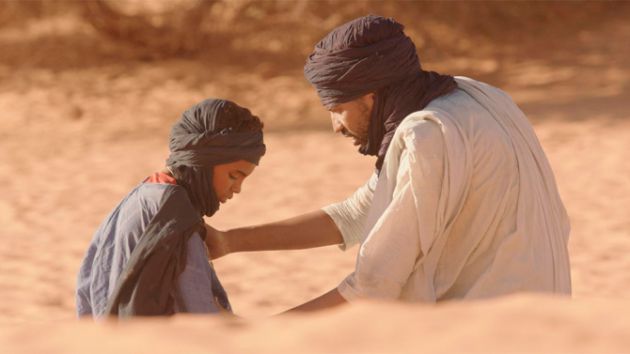Film about autocratic Islamic rule in Mali village wins Ecumenical Prize at Cannes

The Ecumenical Jury at the Cannes Film Festival has awarded its prize to a film about the imposition of a totalitarian form of Islam on a village in the northwestern African country of Mali, Variety magazine reports.
Timbuktu, directed by Abderrahmane Sissako, a filmmaker from Mauritania, tells the story of how local people resist the arrival of extremists who want to restrict women's liberty and to outlaw music and football.
The film shows the fear instilled by zealots, who break the most basic codes of Islam, the faith they claimto represent an shows them marching into mosques carrying arms, flouting the wishes of the local imam.
"'Timbuku' wows critics at Cannes," said a headline on the Euronews website during last week's film festival in which the prizes were awarded Saturday.
"Often, it's cities themselves that are taken hostage, entire cultures that are taken hostage. That's as dangerous, if not more dangerous, than when it's one or two people," Sissako who was born in Mauritania and lived there and in Mali told Euronews.
"That's what's unbearable for me as an artist, the harm that these men are doing to a religion and traditions through their actions. I have experienced this and suffered from it, and I am trying to bear witness to this, to show what is happening."
"The Ecumenical Jury draws attention to those works of quality which touch the spiritual dimension of our existence, expressing the values of justice, human dignity, respect for the environment, peace and solidarity," .
These values, shared in all cultures, are also those of the Christian Gospel.
The jury's citation said: "This film is a strong yet nuanced denunciation of an extremist interpretation of religion."
The Ecumenical Jury Prize is awarded each year at the Cannes Film Festival by a jury of Catholic and Protestant film specialists.
The prize is awarded to a film of high artistic achievement that reflects spiritual, social and ethical values.
Winning directors are presented with a medal and a statement by the jury about the motivation for their choice.
In selecting Timbuktu for its top award, the jury expressed appreciation for the hope inherent in the actions of local people and their Imam as they resist the outsiders and seek to continue to practice a moderate form of Islam.
In accepting the award, Sissako said: "We are not of the same religion but all religions are about love. This film is about when religion is taken hostage, when love is taken hostage."
The story in the films focuses on the impact of strangers seeking to impose a severe interpretation of Islamic law taking over the community relating to an agricultural family.
CONDEMNED TO DEATH
The father of the family is subjected to an arbitrary trial and condemned to death when he accidently kills a neighbor in a dispute over a cow.
The jury also awarded special mentions to two films shown in a separate competitive section Un Certain Regard (A Certain Perspective) for feature films.
Wim Wenders' The Salt of the Earth, a documentary about photographer Sebastiao Salgado, was cited for its testimony to the human rights and environmental challenges confronting peoples worldwide.
The second film, Hermosa Juventud by Spain's Jaime Rosales, highlights the challenges facing a young couple trying to survive the current economic crisis.
This year is the 40th anniversary of the creation of the Ecumenical Jury for the Cannes Film Festival, considered a premier global film festival.
The six-member ecumenical jury is appointed by Signis, a worldwide association of Catholic communicators and by Interfilm, an international network of Protestant film specialists and theologians.
The World Council of Churches reports that it was involved with the Interfilm through its communications director John Taylor in the 1960s and his support of Interfilm from the outset.
The Ecumenical Jury members choose the winning film from those in competition for the festival's top prize, the Palme d'Or (The Golden Palm). This year, 18 films from 12 countries are vying for honors.
Ecumenical Jury members evaluate films according to their aesthetic merits and the questions they raise about Christian responsibility in contemporary society.
Past winners of the Ecumenical Jury Prize at Cannes include: Wim Wenders, Denys Arcand, Mike Leigh and Zhang Yimou.
The Belgian filmmakers Jean-Pierre Dardenne and Luc Dardenne had last week clinched the 40th Anniversary Prize of the Ecumenical Jury in honor of their work.
The two brothers have received numerous awards including two Palmes d'Or (The Golden Palm) and two mentions by Ecumenical juries at Cannes: The Son (2002) and the Rosetta (1999).
Members of the Ecumenical Jury are Guido Convents (Belgium), Maria José Martinez Ordonez (Ecuador) and Hervéa Giraud (France) representing Signis, and Julia Helmke (Germany), Kristine Greenaway (Canada) and Jacques Champeaux (France) representing Interfilm.